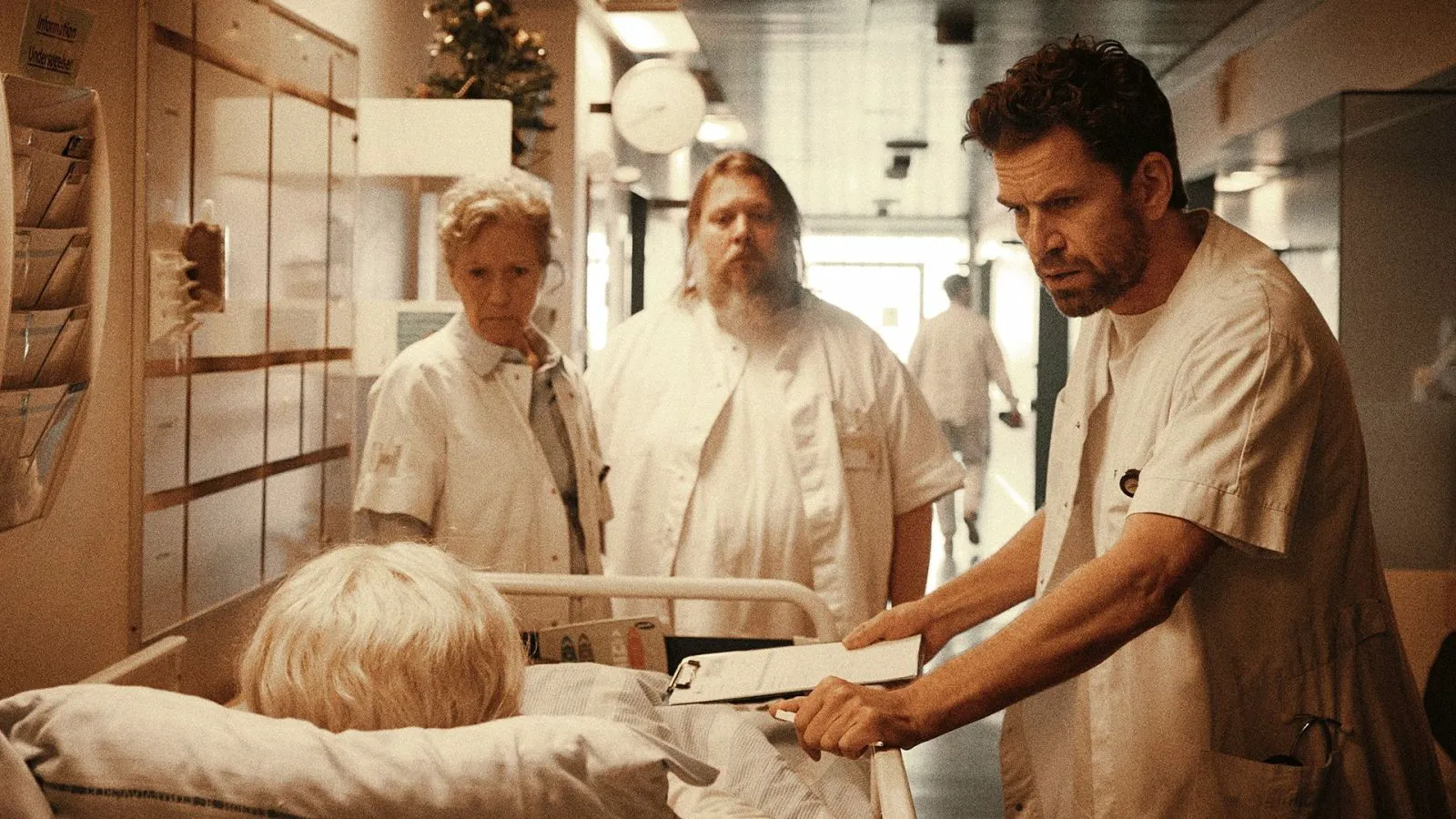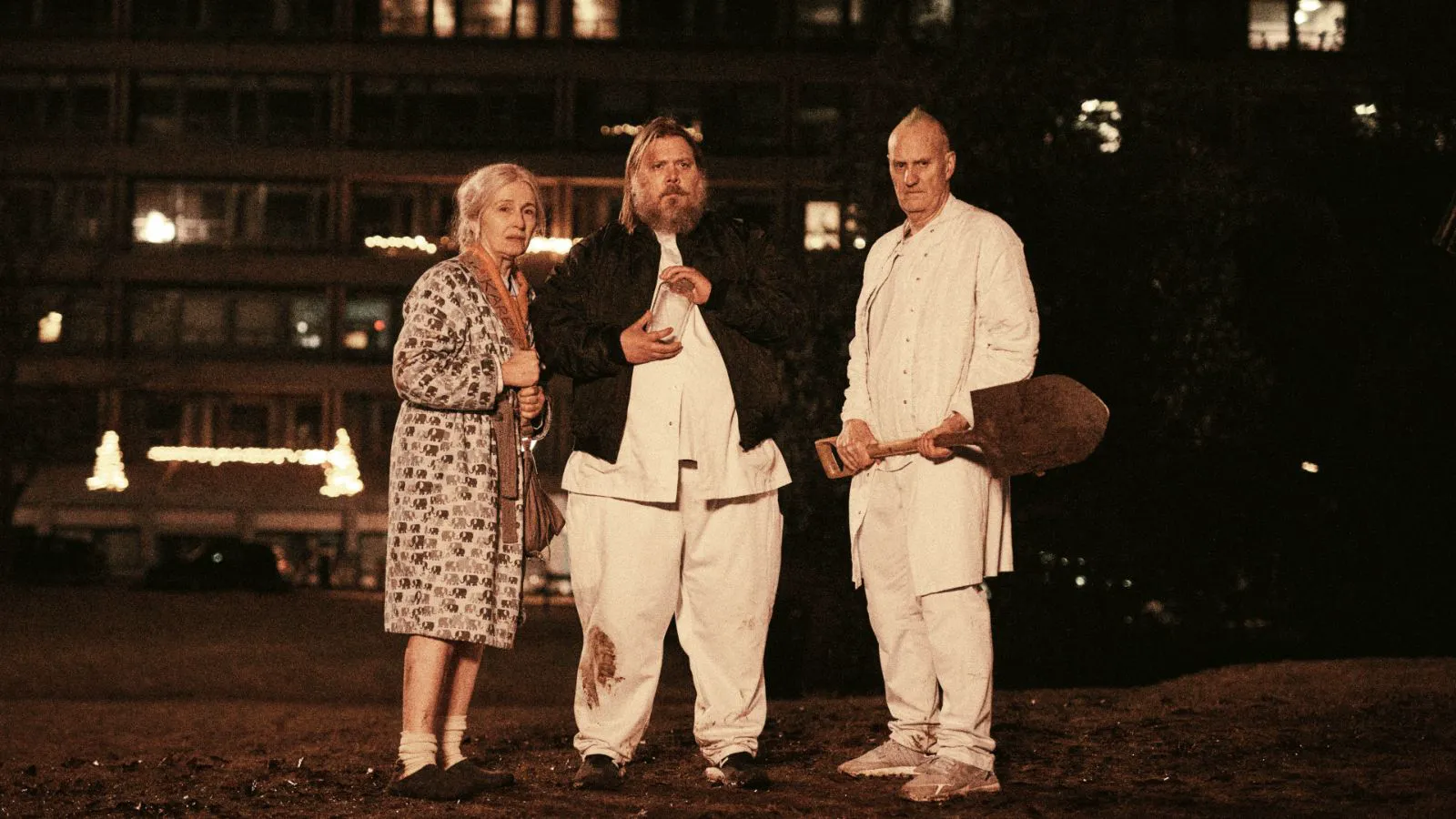In the end credits of each episode of the two seasons of “The Kingdom,” a young Lars von Trier would explain to viewers what they had just witnessed. In the new season, “The Kingdom Exodus,” instead of his face, we only see the tips of his shoes peeking out from behind a red curtain. Almost 30 years have passed since the premiere of the first episodes of “The Kingdom.” The world and its moral foundations have changed. Trier emerged from a creative crisis, received the Palme d’Or, fell back into crisis, gifted the world with a couple more masterpieces, and then disappointed many with the thriller “The House That Jack Built.” This latest fall and self-repetition were interpreted in various ways: some saw it as a natural course of events, while others decided that the talent of the great master of shock was devoured by depression medication and abstinence from alcohol.

Still from “The Kingdom Exodus” by Lars von Trier
The Evolution of Trier’s Style
The first season of “The Kingdom” was also created during a difficult time: before the premiere of the highly acclaimed “Europa” (1991), Lars von Trier’s mother passed away. On her deathbed, she revealed a secret to him: he did not have Jewish blood; she had deliberately cheated on her husband with a German musician so that her child would belong to the “great Aryan nation.” This devastated Lars, who had attended synagogue and played Jewish characters in his first three films. We don’t know how truthful the director’s stories about his past are, but through “The Kingdom,” we can see how Trier’s style transformed. His first trilogy, “E” (“The Element of Crime,” “Epidemic,” and “Europa”), imitated the cinema of “great masters” with complex location shooting, long panoramic shots, and dreamlike stories. The author himself calls this style “****** (damn) mythology,” which in reality means nothing but attracts the attention of pseudo-intellectuals with the depth of a dirty puddle.

Still from “The Kingdom Exodus” by Lars von Trier
From Seriousness to “Idiotism”
In the first season of “The Kingdom,” Trier mocks fans (including himself) of such work, periodically making references to previous works. But in the series, he develops the unseriousness found in “Epidemic” (1987) and turns it into “idiotism”: in “The Kingdom,” a Swedish doctor dreams of the collapse of Denmark, a faking grandmother enters into a spiritual contact with the spirit of a little girl, and the clinic’s budget savings are placed above the lives of patients. Unexpectedly for Trier, the series became a success, inspired him for future masterpieces, and helped him find his signature intonation, where black humor is hidden beneath cold seriousness. The third season of “The Kingdom” could not be filmed due to the deaths of the lead actors, but after years, Trier returned to the project. David Lynch did the same with “Twin Peaks,” but after two episodes, the Dane loses to the American with a crash.

Still from “The Kingdom Exodus” by Lars von Trier
“The Kingdom Exodus”: A Return to the Absurd?
In “The Kingdom Exodus,” Lars von Trier followed the path of Lana Wachowski and her “The Matrix Resurrections.” At the beginning of the first episode, an elderly Karen (Laura Christensen), after watching “The Kingdom,” goes to the clinic, where everyone is also aware of Lars’s creation, as it has significantly damaged the institution’s reputation. Nevertheless, 30 years later, the hospital has not changed; only in the basement, dishes are washed not by people with Down syndrome, but by a robot and a person with the genetic disease progeria. The same goofy doctors still walk the corridors, the boss lays out solitaire, and the new doctor from Sweden, the son of the previous chief neurosurgeon, Helmer (Mikael Persbrandt), also goes crazy from working with the insane Danes.
“The Kingdom Exodus” is a highly professional and the funniest project from Lars von Trier, but you always expect more from the master. The author keeps his finger on the pulse of time, constantly joking about Swedish arrogance, the rigidity of Danish society, where there is no gender equality or ethnic representation, some doctors are mindlessly ready to conduct experiments on people, while others come to a scientific conference for the buffet after the event. “****** (damn) mythology” has also not disappeared: the walls of the hospital “breathe,” the labyrinth of the dungeon holds secrets, the sleepwalker Karen, like her predecessor, comes into contact with ancient spirits, and Karen is haunted by either an evil scientist or a creature from the afterlife (played, of course, by Willem Dafoe).
Each scene of “Exodus” is executed with filigree precision, but it is unclear why Lars von Trier revived a long-forgotten project. David Lynch had a good reason: he could not film “Twin Peaks” according to his rules and convey important ideas to him. Trier had no such problems. His “Kingdom” also has mysticism, red curtains, flying owls, doppelgangers, and old women-seers, but there is no comprehensive artistic statement. It seems that Trier decided to return to “idiotism” in its purest form, rejecting any pathos and meaningfulness of actions. Perhaps the great Danish director has gone through all the unknown paths for himself and therefore chose one close to his heart: the path of childish absurdity and sincerity, freeing himself from adult responsibility.